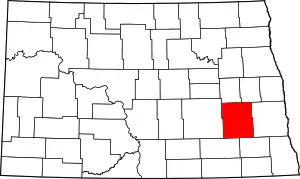Leal, North Dakota
Leal is a city in Barnes County in the state of North Dakota. The population was 27 at the 2020 census.[4] Leal was founded in 1892. The name comes from the Scots word for "faithful," which in the phrase laund o the leal means Heaven.[5]
Leal, North Dakota | |
|---|---|
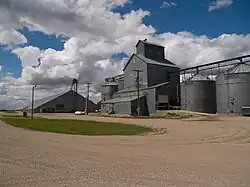 Grain elevators in Leal | |
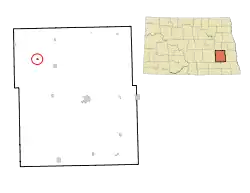 Location of Leal, North Dakota | |
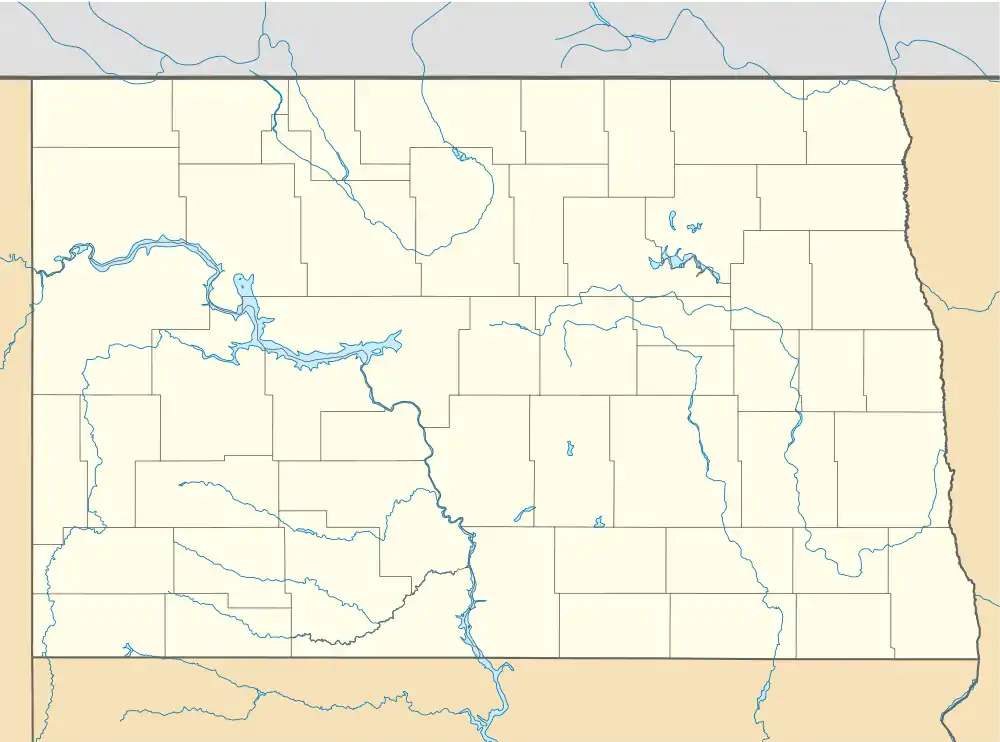 Leal, North Dakota | |
| Coordinates: 47°6′20″N 98°18′59″W | |
| Country | United States |
| State | North Dakota |
| County | Barnes |
| Founded | 1892 |
| Incorporated (village) | 1917 |
| Incorporated (city) | 1967 |
| Named for | Scottish for "faithful" |
| Government | |
| • Type | Mayor-Council |
| • Mayor | Dave Lokken |
| Area | |
| • Total | 0.13 sq mi (0.33 km2) |
| • Land | 0.13 sq mi (0.33 km2) |
| • Water | 0.00 sq mi (0.00 km2) |
| Elevation | 1,467 ft (447 m) |
| Population (2020) | |
| • Total | 27 |
| • Density | 209.30/sq mi (80.87/km2) |
| Time zone | UTC-6 (CST) |
| • Summer (DST) | UTC-5 (CDT) |
| ZIP code | 58479 |
| Area code | 701 |
| FIPS code | 38-45460 |
| GNIS feature ID | 1029852[3] |
History
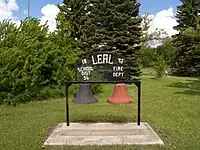
Scottish-English emigrants from Ontario, Canada, originally settled in this area in 1883. The townsite of Leal was platted in 1892, and a post office established December 28, 1892. Officials with the Soo Line Railroad established a station here in 1902.[5][6]
Leal incorporated as a village in 1917 from part of Edna Township.[7] It became a city in 1967, after the North Dakota Legislature eliminated incorporation titles for villages and towns. As a result, all incorporated municipalities in North Dakota automatically adopted a city form of government.[8]
Geography
Leal is located in Edna Township in the northeastern part of Barnes County. It is 73 miles (117 km) west of Fargo, and the nearest city is Rogers.[9]
According to the United States Census Bureau, the city has a total area of 0.14 square miles (0.36 km2), all land.[10]
Climate
Due to its location in the Great Plains and distance from both mountains and oceans, the city has an extreme continental climate, USDA Plant Hardiness Zone 4. The lowest temperature ever recorded was −37 °F (−38 °C) on December 23, 1983, and the highest temperature ever recorded was 106 °F (41 °C) on July 30, 2006.[11]
Demographics
| Census | Pop. | Note | %± |
|---|---|---|---|
| 1920 | 88 | — | |
| 1930 | 105 | 19.3% | |
| 1940 | 102 | −2.9% | |
| 1950 | 72 | −29.4% | |
| 1960 | 70 | −2.8% | |
| 1970 | 41 | −41.4% | |
| 1980 | 45 | 9.8% | |
| 1990 | 35 | −22.2% | |
| 2000 | 36 | 2.9% | |
| 2010 | 20 | −44.4% | |
| 2020 | 27 | 35.0% | |
| 2021 (est.) | 24 | [12] | −11.1% |
| U.S. Decennial Census[13] 2020 Census[4] | |||
2010 census
As of the census of 2010, there were 20 people, 10 households, and 6 families residing in the city. The population density was 142.9 inhabitants per square mile (55.2/km2). There were 11 housing units at an average density of 78.6 per square mile (30.3/km2). The racial makeup of the city was 95.0% White and 5.0% from two or more races.
There were 10 households, of which 10.0% had children under the age of 18 living with them, 40.0% were married couples living together, 20.0% had a female householder with no husband present, and 40.0% were non-families. 40.0% of all households were made up of individuals, and 10% had someone living alone who was 65 years of age or older. The average household size was 2.00 and the average family size was 2.50.
The median age in the city was 53 years. 15% of residents were under the age of 18; 10% were between the ages of 18 and 24; 15% were from 25 to 44; 45% were from 45 to 64; and 15% were 65 years of age or older. The gender makeup of the city was 35.0% male and 65.0% female.
2000 census
As of the census of 2000, there were 36 people, 12 households, and 11 families residing in the city. The population density was 272.4 inhabitants per square mile (105.2/km2). There were 12 housing units at an average density of 90.8 per square mile (35.1/km2). The racial makeup of the city was 100.00% White. The top 4 ancestry groups in the city are Norwegian (65.5%), German (21.8%), Italian (16.4%), and French (16.4%). 21 residents reported having multiple ancestries, meaning these percentages add up to more than 100% of the population.[14]
There were 12 households, out of which 58.3% had children under the age of 18 living with them, 66.7% were married couples living together, 25.0% had a female householder with no husband present, and 8.3% were non-families. 8.3% of all households were made up of individuals, and 8.3% had someone living alone who was 65 years of age or older. The average household size was 3.00 and the average family size was 3.18.
In the city, the population was spread out, with 38.9% under the age of 18, 5.6% from 18 to 24, 27.8% from 25 to 44, 19.4% from 45 to 64, and 8.3% who were 65 years of age or older. The median age was 34 years. For every 100 females, there were 63.6 males. For every 100 females age 18 and over, there were 83.3 males.
The median income for a household in the city was $28,750, and the median income for a family was $31,875. Males had a median income of $27,188 versus $0 for females. The per capita income for the city was $10,662. About 13.3% of families and 9.1% of the population living below the poverty line, including 13.0% of those under 18 and none of those aged 65 and over.
External links
| Climate data for Leal, North Dakota | |||||||||||||
|---|---|---|---|---|---|---|---|---|---|---|---|---|---|
| Month | Jan | Feb | Mar | Apr | May | Jun | Jul | Aug | Sep | Oct | Nov | Dec | Year |
| Average high °F (°C) | 20 (−7) |
25 (−4) |
38 (3) |
55 (13) |
69 (21) |
77 (25) |
82 (28) |
81 (27) |
70 (21) |
55 (13) |
36 (2) |
24 (−4) |
53 (12) |
| Average low °F (°C) | 1 (−17) |
7 (−14) |
19 (−7) |
32 (0) |
44 (7) |
54 (12) |
58 (14) |
55 (13) |
45 (7) |
33 (1) |
19 (−7) |
7 (−14) |
31 (0) |
| Average precipitation inches (mm) | 0.56 (14) |
0.50 (13) |
0.80 (20) |
1.26 (32) |
2.61 (66) |
2.99 (76) |
3.15 (80) |
2.25 (57) |
1.62 (41) |
1.36 (35) |
0.63 (16) |
0.48 (12) |
18.21 (462) |
| Source: MSN.com[11] | |||||||||||||
References
- "Township and City Officers". Barnes County, North Dakota. Archived from the original on August 16, 2009. Retrieved September 22, 2009.
- "ArcGIS REST Services Directory". United States Census Bureau. Retrieved September 20, 2022.
- "US Board on Geographic Names". United States Geological Survey. October 25, 2007. Retrieved January 31, 2008.
- "Explore Census Data". United States Census Bureau. Retrieved July 21, 2022.
- Wick, Douglas A. (1988). North Dakota Place Names. Bismarck, N.D.: Hedemarken Collectibles. p. 111. ISBN 0-9620968-0-6. OCLC 191277027.
- Williams, Mary Ann (Barnes) (1966). Origins of North Dakota place names. Bismarck, North Dakota: Bismarck tribune, 1966. p. 14. OCLC 431626.
- U.S. Census Bureau (1921). "Number and Distribution of Inhabitants, North Dakota" (PDF). Fourteenth Census of the United States: 1920. Government Printing Office. Retrieved July 20, 2008.
- North Dakota Secretary of State (1989). North Dakota Centennial Blue Book. Bismarck, ND: North Dakota Legislative Assembly. p. 500.
- "Leal Forks, North Dakota (ND) Detailed Profile". City-Data.com. Retrieved September 22, 2009.
- "US Gazetteer files 2010". United States Census Bureau. Archived from the original on July 2, 2012. Retrieved June 14, 2012.
- "MSN Weather". MSN.com. Archived from the original on June 7, 2007. Retrieved June 5, 2007.
- "City and Town Population Totals: 2020-2021". United States Census Bureau. July 21, 2022. Retrieved July 21, 2022.
- United States Census Bureau. "Census of Population and Housing". Retrieved October 31, 2013.
- U.S. Census Bureau. Census 2000. "QT-P13. Ancestry, Leal, North Dakota". American FactFinder. <http://factfinder.census.gov>. Retrieved January 31, 2009.
